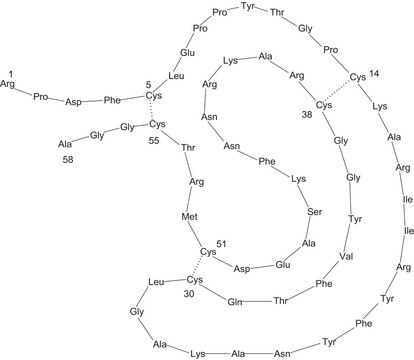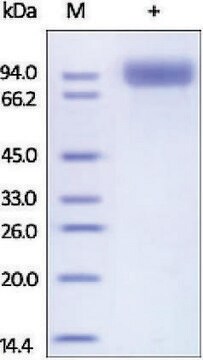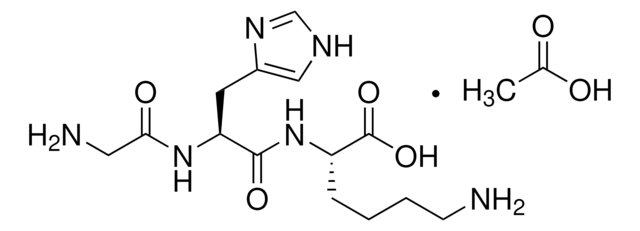S9129
Somatostatin
≥97% (HPLC), powder
Synonym(s):
Growth hormone release inhibiting factor, SRIF, Somatostatin-14, Somatotropin release inhibiting factor
About This Item
Recommended Products
Quality Level
Assay
≥97% (HPLC)
form
powder
storage temp.
−20°C
SMILES string
[H]N1[C@@H](Cc2ccccc2)C(=O)N[C@@H](Cc3ccccc3)C(=O)N[C@@H](Cc4c[nH]c5ccccc45)C(=O)N[C@@H](CCCCN)C(=O)N[C@@H]([C@@H](C)O)C(=O)N[C@@H](Cc6ccccc6)C(=O)N[C@@H]([C@@H](C)O)C(=O)NC(CO)C(=O)N[C@@H](CSSC[C@H](NC(=O)CNC(=O)[C@H](C)N)C(=O)N[C@@H](CCCCN)C(=O)N[C@@H](CC(N)=O)C1=O)C(O)=O
InChI
1S/C76H104N18O19S2/c1-41(79)64(100)82-37-61(99)83-58-39-114-115-40-59(76(112)113)92-72(108)57(38-95)91-75(111)63(43(3)97)94-71(107)54(33-46-23-11-6-12-24-46)90-74(110)62(42(2)96)93-66(102)51(28-16-18-30-78)84-69(105)55(34-47-36-81-49-26-14-13-25-48(47)49)88-68(104)53(32-45-21-9-5-10-22-45)86-67(103)52(31-44-19-7-4-8-20-44)87-70(106)56(35-60(80)98)89-65(101)50(85-73(58)109)27-15-17-29-77/h4-14,19-26,36,41-43,50-59,62-63,81,95-97H,15-18,27-35,37-40,77-79H2,1-3H3,(H2,80,98)(H,82,100)(H,83,99)(H,84,105)(H,85,109)(H,86,103)(H,87,106)(H,88,104)(H,89,101)(H,90,110)(H,91,111)(H,92,108)(H,93,102)(H,94,107)(H,112,113)/t41-,42+,43+,50-,51-,52-,53-,54-,55-,56-,57?,58-,59-,62-,63-/m0/s1
InChI key
NHXLMOGPVYXJNR-FQSIDJEASA-N
Gene Information
human ... SSTR1(6751) , SSTR2(6752) , SSTR3(6753) , SSTR4(6754) , SSTR5(6755)
Looking for similar products? Visit Product Comparison Guide
Amino Acid Sequence
General description
Application
- as a standard antigen to detect antibodies in an indirect enzyme-linked immunosorbent assay (ELISA) method
- to study the effect of somatostatin on oxytocin release during pregnancy in rats
- to test the specificity of the avidin-biotinylated horseradish peroxidase immunocytochemical procedure to visualize somatostatin-immunoreactive (SS-IR) neurons
Biochem/physiol Actions
Other Notes
related product
Storage Class Code
11 - Combustible Solids
WGK
WGK 3
Flash Point(F)
Not applicable
Flash Point(C)
Not applicable
Personal Protective Equipment
Certificates of Analysis (COA)
Search for Certificates of Analysis (COA) by entering the products Lot/Batch Number. Lot and Batch Numbers can be found on a product’s label following the words ‘Lot’ or ‘Batch’.
Already Own This Product?
Find documentation for the products that you have recently purchased in the Document Library.
Customers Also Viewed
Our team of scientists has experience in all areas of research including Life Science, Material Science, Chemical Synthesis, Chromatography, Analytical and many others.
Contact Technical Service









![[deamino-Cys1, D-Arg8]-Vasopressin acetate salt hydrate ≥95% (HPLC)](/deepweb/assets/sigmaaldrich/product/structures/215/222/82da3633-80ea-463d-8b55-e99fb8e442e0/640/82da3633-80ea-463d-8b55-e99fb8e442e0.png)



